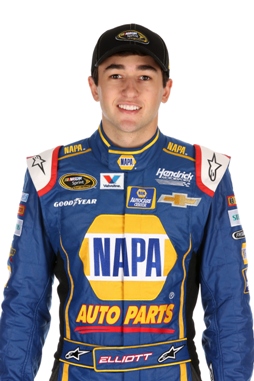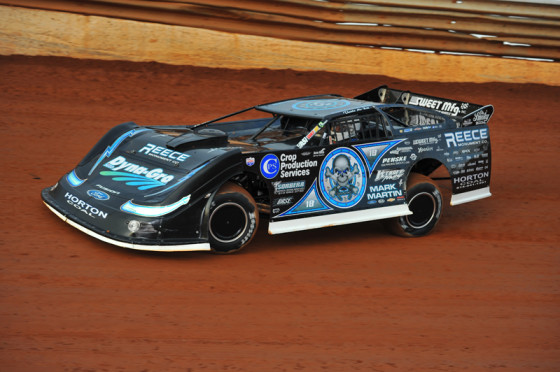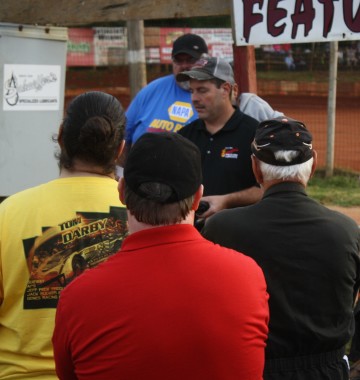This past weekend, the most well known asphalt short track race not associated with NASCAR was contested at the Five Flags Speedway in Pensacola, Fla. and the race ended with some controversy. Eventual Snowball Derby winner Chase Elliott was not actually the first driver to cross the finish line. Instead, Christopher Bell, who won the NASCAR Camping World Truck Series event earlier this year at the Eldora Speedway, had taken the checkered flag ahead of the pack.
However, Bell’s Kyle Busch Motorsports entry was deemed illegal during post-race technical inspection and that driver was disqualified, moving Elliott into the winner’s circle.
That particular race has somewhat of a reputation for being tough on competitors whose cars fall even slightly outside the rule book. As a matter of fact, Elliott had himself fallen victim to the so-called ‘room of doom’ after initially looking like a winner two years ago. On Sunday, Bell had been forced to start well back in the pack due to a disqualification when his car was found to be outside specifications following his effort in time-trials earlier in the weekend.
All of this turmoil caused this writer to consider the harshness of the complete disqualification of a race winner due to a rules violation. That was especially true considering that Dirt Late Model racing had a significant DQ earlier this year when Scott Bloomquist was denied the winner’s check at the lucrative ‘Dream’ at Eldora after his car came up light at the scales following the race.
As a result, I took to social media to see what dirt racing fans think of harsh post-race penalties. On both my Twitter feed and my ‘Dirt Racing’ page on Facebook, support for such action was overwhelming.
While NASCAR doles out fines and point reductions when infractions are found in post-race tech, both asphalt and dirt short-track racing take a more stern view. In many instances, the driver and team in question are completely thrown out. In other words, it would be as if they were never even there. This is not always the case as the offender may sometimes be placed last in the order and receive last place money. Either way, this is a harsh sentence for playing outside the rule book.
NASCAR made the decision to take the stance it now takes following a race at the Atlanta Motor Speedway in 1978. That event did not feature a rules infraction, but rather, a scoring error that had left drivers, fans and officials in limbo for hours. After flipping back and forth between Donnie Allison and Richard Petty, it was ultimately decided that Allison was the victor(I was at that race, and as a young Petty fan, had left the track thinking my hero had won). The sanctioning body decided after that race their fans would leave the track knowing who the winner was, even if that winner was later found to have a violation.
On more than one occasion as a dirt racing reporter, I have left a track and come home to write my story of the event only to find out that the winner had been disqualified and I would have to do a re-write.
But as fans, it seems as though you favor that action. In the poll questions mentioned above, the results were overwhelmingly in favor of disqualifying winners who fail to pass inspection. More than 90% in both polls combined said so.
However, there were some qualifications listed. Some believed the nature of the infraction should be taken into account while others believed that a certain degree of leniency, which the Snowball Derby is not known for, ought to be offered. Still, though, dirt racing fans appear to be dead set in their belief that “cheaters shouldn’t prosper”(and yes, I realize that many violations are not actually cheating, but honest mistakes).
Tracks and/or series have to keep several things in mind if they wish to disqualify winners after infractions are found. First, rulings must be consistent from week to week. A track or a series can’t allow the appearance of favoritism to take hold and the quickest way for that to happen is to deliver one ruling for a certain violation one week then a contradictory ruling the next.
Another factor to consider is that rules must be written in a clear and concise way. If rules allow for too much leeway or are difficult to understand, a disqualification could be hard to defend or explain. Furthermore, it is essential that any changes made during the season be communicated clearly and with enough time for teams to make the necessary changes.
Any failure to handle the two points above appropriately will almost certainly result in “bad mouthing” of the particular track or series which can bring about a loss of fans and competitors. In other words, a track that is perceived to be unfair, play favorites, or be incompetent will have a difficult time remaining in business.
It is the viewpoint of this writer that taking wins away from cars found in violation of the rules is the right thing to day. The winner of a race should be the car that was first to finish among those in conformity with the previously established guidelines.
And furthermore, common sense(without favoritism) must be applied when both writing and enforcing the rules.








